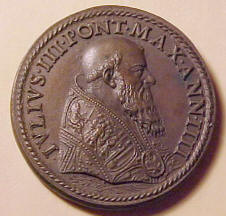 Paul
III had moved the ecumenical council from Trent to Bologna. This enraged the
Emperor, who forbade his subjects to leave Trent. With some members at Trent and
others at Bologna, the council was at a standstill. But after Paul's death the
man chosen to succeed him was Cardinal del Monte who, as senior papal legate,
had opened the council. Now he ordered the fathers back to Trent and once more
the great work of the council went forward. Unfortunately, however, the defeat
of the Emperor by the Schmalkaldic army and lack of French cooperation forced
the Pope to suspend the council in 1552.
Paul
III had moved the ecumenical council from Trent to Bologna. This enraged the
Emperor, who forbade his subjects to leave Trent. With some members at Trent and
others at Bologna, the council was at a standstill. But after Paul's death the
man chosen to succeed him was Cardinal del Monte who, as senior papal legate,
had opened the council. Now he ordered the fathers back to Trent and once more
the great work of the council went forward. Unfortunately, however, the defeat
of the Emperor by the Schmalkaldic army and lack of French cooperation forced
the Pope to suspend the council in 1552.
Giovan Maria Ciocchi del Monte was born in Rome on September 10, 1487, the son
of a brilliant lawyer. After studies in law and theology he became archbishop of
Siponto. He served Clement VII as prefect of Rome and, less agreeably, as a
hostage to the wild men who had sacked the city. Indeed, when poor Clement could
not keep up the exorbitant payments demanded, the future pope was very close to
being hanged! Created cardinal by Paul III, he served on the commission to
prepare for the great council and then as the council's first president. His
election on February 7, 1550, was the result of a compromise.
He took the name Julius III. Julius was a well-meaning but easy-going man. He
favored his relatives, spent money lavishly, and loved good times. But on the
other hand, he did continue Paul III's work in favoring the forces of reform. At
the instance of St. Ignatius he founded the famous German College to provide
zealous and learned priests for the afflicted Empire. Julius showed excellent
good sense and tact in his dealings with England. Mary, now on the throne, was
negotiating for the return of England to Catholic unity. Julius appointed her
kinsman Cardinal Pole to be his legate in the matter and gave him the widest
faculties to ease troubled consciences. He did not insist on the return of
stolen monastic property. He was rewarded by seeing England once more a Catholic
country. Julius III, greatly interested in learning and art, promoted the
development of the Vatican Library and of the Roman and various German
universities. He favored Michael Angelo and the historian of art, Vasari.
Pierluigi Palestrina, the great composer, he placed in charge of St. Peter's
choir. Julius might have been more fond of ease and jollification than suited
either his state or the times, but it is to his credit that the work of reform
did continue. By the time Julius died on March 23, 1555, St. Peter Canisius was
spearheading a Catholic reaction in Germany, St. Francis Xavier had died trying
to get into China after an epic sweep through the Indies and Japan, and zealous
Franciscans and Dominicans were spreading the gospel in the Americas.
Excerpted from "Popes
Through the Ages" by Joseph Brusher, S.J.

